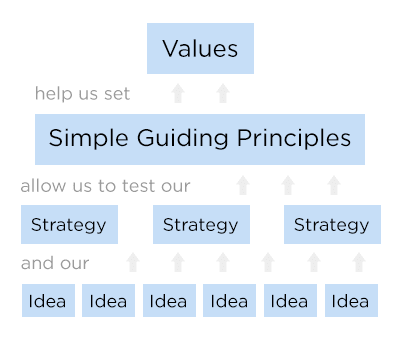Plans are worthless, but principles are everything

Eisenhower is often quoted as saying “Plans are worthless, but planning is everything”. I do not disagree, but as a motto, it is a little confusing and could do with some clarification. Is planning enough? A plan is really just steps to take in order to put an idea into action. Many organisations have planned and put ideas into action to find that the plan failed because it didn’t follow a set of principles.
“But we planned everything”
I mentioned in a previous post about creating a principled organisation that M&S was taking some criticism for the well-intentioned LGBT sandwich, with many members of the public pointing out that they also opened stores over the last 4 years in Saudi Arabia. It seems that they attempted to show they held certain values whilst also pursuing a strategy that was not coherent with that set of values. They are not the only organisation to fall foul of this. Burger King also did a similar thing when attempting to use Mental Health Awareness week to show they cared for their customer’s mental health which caused many criticisms. Least of all the criticisms was surrounding the way they pay their staff and whether that would be coherent with a caring for people’s mental health.
So how do we create plans that are in line with the values we want ourselves or our organisations to portray?
Forgoing the planning stage
A friend of mine was telling a brief story of his work life over the previous 15 years. It involved him working and living across various countries and creating various communities. At the end of the story he said:
The older I get, the more I learn, the more I realise I know nothing about anything, that plans are great, but rarely come true, and keeping space for the unexpected usually yields far better outcomes.
Now I’m not seriously suggesting we don’t go through the planning stage as planning encompasses all the stages of achieving goals, turning ideas into action and making events happen. What I do think is missing is that most of us don’t test our plans as we have nothing to test them against. If M&S had a set of values in place they could use those to create some guiding principles to create strategies from. The principles will keep those strategies in-line with the organisation values and offer something to test ideas against before they become plans.
What is the difference between a strategy and a plan
Put simply a strategy is the why and plans are the how. So if we are clear about why we are doing something and we can test that against some guiding principles to keep the strategy in line with our values. When we come to ideas of how to achieve our strategy we can again test each idea against the strategy and the guiding principles and reject the ideas that do not fit.

This all illustrates how important it is for every organisation to have a set of values and some simple guiding principles set out clearly and in as simple terms as possible. The reason for them to be clear and set out in simple terms is two-fold.
- It is much easier to live up to your values and follow your guiding principles when there is as little ambiguity as possible;
- Communicating your values and principles to your customers will help you to build a lasting customer relationship.
So perhaps that Eisenhower quote can be amended to:
Plans are worthless, but values and principles are everything